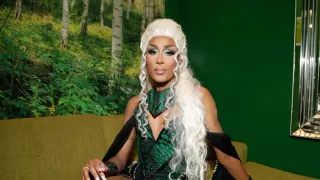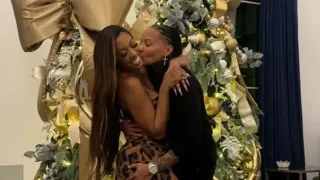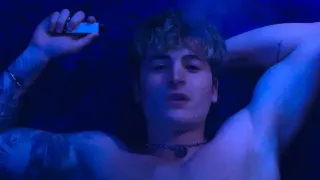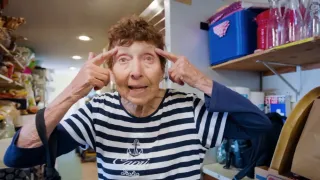November 9, 2018
Desiree Akhavan on Bringing 'Cameron Post' to the Screen, Part Two
Robert Nesti READ TIME: 9 MIN.
Editor's note: EDGE spoke to Desiree Akhaven about her film "The Miseducation of Cameron Post," when it was released this past August and recently became available on digital and streaming platforms . We revisit the interview with the release of the film on streaming and digital platforms. Akhaven also discusses her upcoming Hulu series "The Bisexual," which premieres on November 16.
She also went onto say that, "Queer movies should be told through a queer lens and created by queer people."
Ms. Moretz made those comments on the morning that we were interviewing Desiree Akhaven, the co-writer and director of "Cameron Post," and Ms. Akhaven had yet to hear of them. In the second half of this interview, Ms. Akhaven addresses Ms. Moretz's comments, as well as discusses "The Bisexual," the upcoming 6-part Hulu series that she not only co-wrote and directed, but also starred in. It is due out in October.
Chlo� Grace Moretz, Sasha Lane and Forrest Goodluck in "The Miseducation of Cameron Post."
EDGE: How did you cast Chlo� Grace Moretz in the film?
Desiree Akhavan: Chlo�'s team asked us for the film. I never thought she would be interested in this film because I thought she was a studio darling. I had never seen her do any indie films so I never thought of her. But when I heard that she was interested, I got really excited because I thought what a great juxtaposition of a persona and a character. She is someone who has always been a princess, an ing�nue, and I love to see her in a role that is so much about gender confusion and female masculinity and a role where she has three sex scenes with women and she masturbates. Like a sexually frank movie from somebody who before was infantilized as a pretty princess. That juxtaposition was very exciting to me.
EDGE: Chlo� made some news recently with
Desiree Akhavan: What did she say?
EDGE: She commented on "Boy Erased," the other gay conversion movie that comes out this fall, labeling it a Hollywood product with a major distributor, a big budget and star power (Nicole Kidman, Lucas Hedges and Joel Edgerton, who wrote and directed). She went on to say that your film "was directed by a bisexual woman of diversity, it has a very diverse cast and we didn't cast all celebrities. You look at the other movie - that movie has distribution already, it's going to come out, it's going to be big - it's written and directed by a white man, it's shot through a straight male gaze. You just look at the discrepancy and that's shocking." And she ended her comments with: "Queer movies should be told through a queer lens and created by queer people."
I know this is coming at you out of the blue, but what do you think of her saying that queer movies should be told through a queer lens and created by queer people?
Desiree Akhavan: Yeah. I am trying to think of how to phrase it. I don't want to try to discredit another film that deals with this subject matter. I think there have been so many films about straight white people getting together. She's straight white and single and she likes him and he's straight white and single and likes her. How are they going to get together? That has been the plot of 80% of movies I have ever seen in my life. And no one ever says, that sounds like your remaking "The Proposal," or that's sounds very Bridget Jones. Instead it is just another movie. I am grateful when more stories come to the table. I think there is room for everyone.
The writer of the book "Boy Erased" sat with Chlo� and me before we went into production and spoke to us about the experience of going through gay conversion therapy. It is a subject matter that can be dealt with a different lens. I care a lot that sex is depicted honestly. I care a lot that female sexuality is depicted honestly. I am sad that stories of female sexuality aren't given the same amount of attention. And it hasn't escaped my attention that the queer stories that have had wide platforms have been ones that focus on men's journeys, like "Call Me By Your Name," "Brokeback Mountain" and "Boy Erased." It has not escaped my attention that they are stories about men. When you are from a marginalized community and your story is told so rarely, it matters who tells it.
But at the same time, I never want to publicly put down a queer story and another filmmaker whose work I have never seen. I can't judge that movie. I have really mixed feelings about all this. I am glad it exists, kudos to them for taking this subject matter that I care about so deeply, and I think there is room for both stories. i don't think they should be pitted against each other. But I wish I lived in a world where we also had a wide platform for this story and people gave a shit about a woman's story, specifically a female director at the helm of that story. I wish we were on equal footing.
Desiree Akhavan on the set of "The Bisexual."
EDGE: While you were in London, you worked on a television series called "The Bisexual?" What is that?
Desiree Akhavan: It started in London, where I have been living for the past few years. It is a co-production between Hulu in the States and Channel 4 in the UK. It will be out in the fall, I think October. I star in it and I co-wrote with the writer and producer of Cameron Post. It is a story of a woman in her 30s who has been identified as a lesbian her whole life and comes out as bisexual and starts sleeping iwht men in her 30s. And it this reverse coming out story of facing the sexual taboos being neither gay nor straight.
EDGE: Is it similar to "Appropriate Behavior?"
Desiree Akhavan: It is similar in tone. I would like to think it is a step up. That I was able to grow into my voice and my humor a bit. It is a comedy - it is sexual coming of age. It also looks at her relationship with her straight male roommate. It is a double-hander between this Iranian bisexual and this straight, white Irish guy (played by Brian Gleeson) and our dynamic of being each other's wingman, me giving him an insight into women, and he giving me the same insight into men.
EDGE: What is it like working in television?
Desiree Akhavan: It was very different. It was a lot harder. It felt like shooting two low-budget feature films back-to-back, then going into the marathon of editing two in a row. I just locked picture a few days ago, then flew out here to promote the movie, so it has been the most intense professional experience in my life. It was really hard. It shows in the work. The show is a singular vision and was made with a love, and I am very proud of it. I think it is really good and funny. But man, it was hard. And also you have other voices in the room, usually with film you are given a fairly long leash. But here you answering to two networks and your executives, so there was a lot of negotiating that I hadn't anticipated. But I think in the end it was all for the best because those different voices in the room helped bring out a lot of quality in the work.
Chlo� Grace Moretz in "The Miseducation of Cameron Post."
EDGE: Did you direct any of them?
Desiree Akhavan: I directed all of them. It was the hardest thing I have ever done in my life. Fortunately it was just a six-episode season, shorter than most American shows. But directing six episodes while I am acting and co-writing. I had my partner Cecilia Frugiuele, but she gave birth right before production. This was the first time she wasn't by my side on set together and it was really hard for me.
EDGE: What is it like acting and directing in the same project?
Desiree Akhavan: It is impossibly hard. I don't want to do it again. I think having directed 'Cameron Post' taught me so much about what you can do potentially as a director if you have space and time and your brain to yourself. But this experience was a real eye opener of the limitations. It worked for this because it was such a personal story and so small. We were showing such a particular neighborhood of London where I live and we were showing such a particular slice that it is nice that my fingerprints are all over it, that my face is all over it, but I could never do it again, especially after doing "Cameron Post," when I was so spoiled. Spoiled in that I had time to think. Every shot in that film is painstakingly perfect to me. I didn't compromise. I did it on my terms with the help of my collaborators. With the show it was just, we have to get through the day. Whatever we can to get through it. Just put the camera down and lets get it. It's not perfect, but I think the way you execute something is dictated by the actual subject matter. It is a different story and doesn't need to be painstakingly precise because it is messier and very different than "Cameron Post."
Forrest Goodluck, Chlo� Grace Moretz and Sasha Lane at the 2018 Sundance Film Festival last January.
EDGE: I read that you want to direct a big, mainstream movie. Why?
Desiree Akhavan: Because those movies touched me growing up. I was raised on mainstream films. I didn't discover French New Wave until I was in college. I loved movies growing up. They raised me. They helped form me. And they also help form a lot of the biases against myself. I wish if those mainstream films, if there politics could align with my own, that could be a lifeline to someone. Watching "Black Panther" really moved me. It was so inspiring to me. The politics of that film - just watching women drive the cars. That's so simple, but it is so powerful. I want that kind of power. I want to change the world for the better in the tiniest way that I can. Movies are so superficial and such a small form of activism, but it is the form that is at my hands. And why wouldn't I try to touch the lives of people who otherwise wouldn't be exposed to something outside the mainstream norm. I want to change the mainstream.
EDGE: Do you want to revisit your character from "Appropriate Behavior" I a sequel?
Desiree Akhavan: No. That's over. I'd like to not act anymore. I will not be creating more situations where I need to act in my own work.
EDGE: What advice would you give a filmmaker just starting out?
Desiree Akhavan: I would tell them to create their own opportunities and not wait for anyone else to enable them. It is like this unspoken understanding in film school that it was like, wait for someone to discover you or someone with money will make someone happen, or you need to cozy up to the right person. That couldn't be farther from the truth. Stay true to your own taste and your own aesthetic, and if you build it they will come.
For more on streaming "The Miseducation of Cameron Post,"
Watch the trailer to "The Miseducation of Cameron Post":






